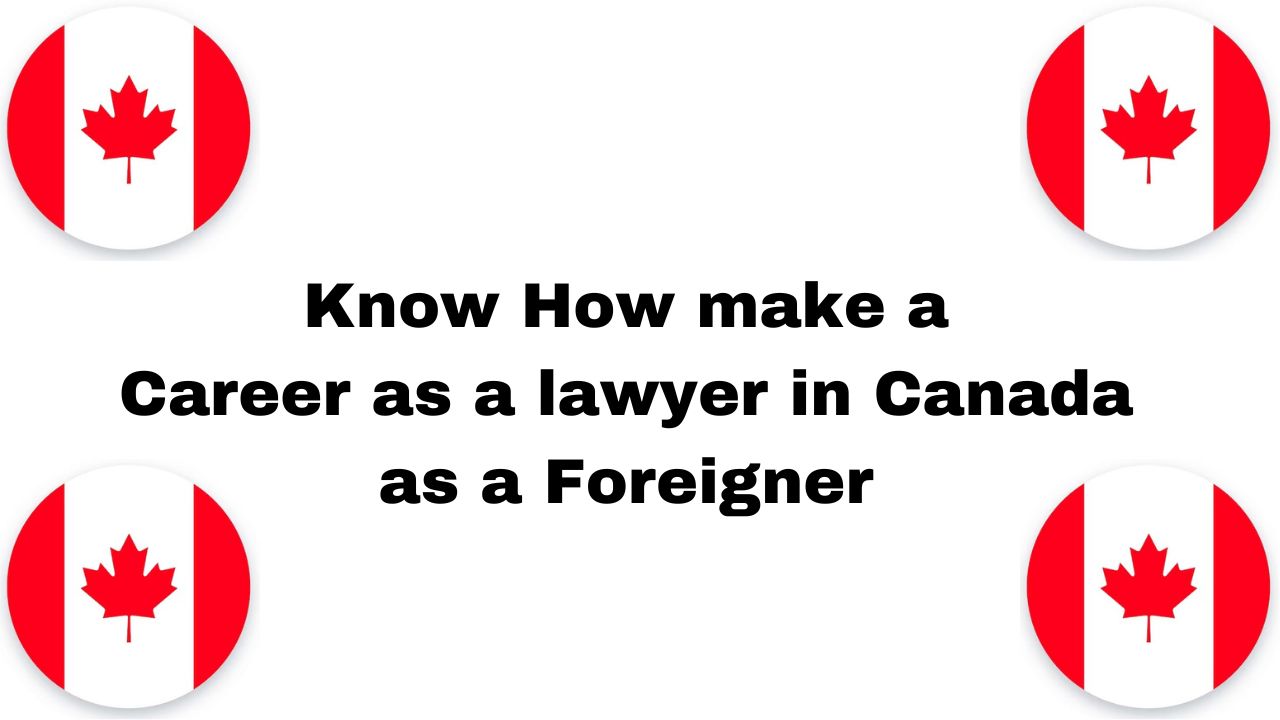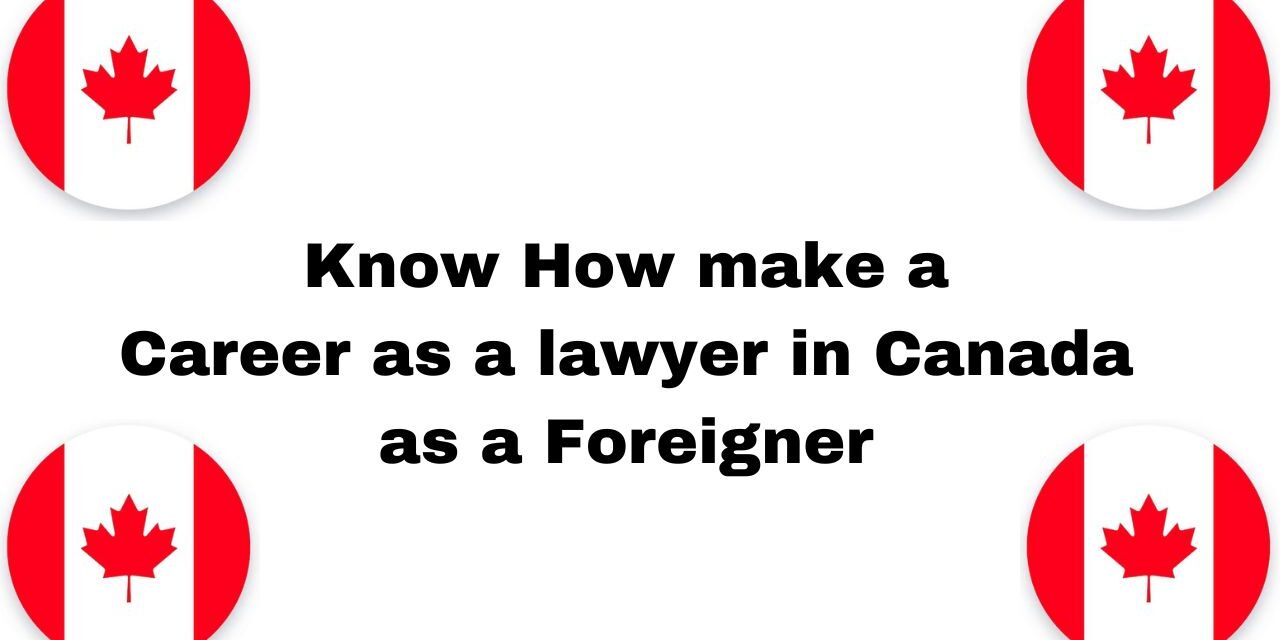Know How make a Career as a lawyer in Canada as a Foreigner in 2024
Welcome to our friendly guide that aims to provide detailed information about pursuing a legal career in Canada as a foreigner.
We understand that navigating the Canadian legal landscape can be overwhelming, but fear not! This blog post will break down the essential information you need to know.
-
Understanding the Canadian Legal System
Canada boasts a robust and well-established legal system, which is essential to understand before starting a legal career there.
The Canadian legal system has two main branches the federal and provincial/territorial. The federal system deals with matters of national importance, such as criminal law and immigration.
In contrast, the provincial/territorial systems handle most other areas of law, including family, property, and civil disputes.
One key aspect of the Canadian legal system is its adherence to the common law tradition, which is derived from British legal principles.
Unlike civil law systems found in many European countries, common law relies heavily on judicial precedent and the interpretation of statutes by judges.
This means that court decisions from previous cases play a significant role in shaping the law and guiding future legal decisions.
Furthermore, Canada has a hierarchical court structure, with the Supreme Court of Canada serving as the highest appellate court in the country.
Beneath the Supreme Court, there are federal and provincial/territorial courts, each with its jurisdiction and authority.
-
Requirements for Becoming a Lawyer in Canada
-
Educational Requirements
To become a lawyer in Canada, one must meet certain educational requirements. The most common path is to obtain a law degree recognized by the Federation of Law Societies of Canada (FLSC).
Many Canadian universities offer Juris Doctor (JD) programs, typically requiring three years of full-time study.
It’s important to note that each province may have specific requirements for recognizing law degrees obtained outside of Canada.
For foreign-educated lawyers with a law degree from a non-Canadian institution, options are available to obtain equivalency recognition.
The National Committee on Accreditation (NCA) is responsible for assessing the qualifications of foreign-educated lawyers and determining their eligibility to practice law in Canada.
The NCA evaluation process involves a comprehensive assessment of legal knowledge and skills. Depending on the assessment, additional exams or coursework may be required.
-
Licensing Process
Once the educational requirements are met, aspiring lawyers must complete the licensing process, typically completing either an articling program or a Law Practice Program (LPP).
-
National Committee on Accreditation (NCA)
Foreign-educated lawyers who have obtained equivalency recognition through the NCA must also satisfy additional requirements, such as completing the required exams and courses.
The NCA exams cover foundational areas of law, including Canadian constitutional law, criminal law, and administrative law. These exams can be challenging, but with proper preparation, they can be completed.
-
Articling or Law Practice Program (LPP)
After fulfilling the NCA requirements, aspiring lawyers must complete a practical training called articling or the LPP.
Articling is a traditional route that involves working under the supervision of a practicing lawyer for a specified period, typically one year.
The LPP, on the other hand, is an alternative program that offers practical training through a combination of coursework and work placements.
It’s important to note that the requirements for articling and the LPP may vary between provinces.
Some provinces may have mandatory articling programs, while others may offer the LPP as an option. Researching the specific requirements of the province where you wish to practice is essential.
Top 15 Highest Paying Jobs in Canada
Job of Anesthesiologist in Canada
III. Immigration Considerations for Foreign Lawyers
-
Work Permits
Foreign lawyers interested in practicing law in Canada must also consider their immigration options.
There are various work permit options available, such as NAFTA work permits for citizens of the United States and Mexico or employer-specific work permits sponsored by Canadian law firms or organizations.
These work permits allow foreign lawyers to work in Canada temporarily, gaining valuable experience and exposure to the Canadian legal system.
Each work permit category has its own eligibility criteria and application procedures. It’s important to consult with an immigration lawyer or visit the official Government of Canada website for up-to-date information on work permit options for foreign lawyers.
-
Permanent Residency
For foreign lawyers interested in settling in Canada permanently, there are pathways to permanent residency available.
The Express Entry system is a popular option, which assesses candidates based on age, education, work experience, and language proficiency.
Legal education and work experience can contribute significantly to immigration points in the Express Entry system.
Provincial Nominee Programs (PNPs) are another avenue to consider. PNPs allow provinces and territories to nominate individuals based on their economic needs.
Some provinces have specific streams tailored to foreign-educated lawyers, making it easier to obtain permanent residency.
Consulting with an immigration lawyer or qualified consultant is highly recommended to explore the best immigration pathways based on individual circumstances.
Truck Driving Jobs in Canada for Foreigners
Aircraft Pilot Jobs in Canada for Foreigners
-
Job Market and Networking Opportunities
Understanding the job market and networking opportunities in the Canadian legal industry is essential for foreign lawyers looking to establish their careers in Canada.
The job market for lawyers in Canada varies depending on the region, practice area, and economic conditions.
Major cities such as Toronto, Vancouver, and Montreal have more opportunities due to their larger legal markets.
Corporate law, litigation, and intellectual property are among the popular practice areas in Canada, but it’s important to research and identify areas of interest and demand.
Networking is a crucial aspect of building a successful legal career in Canada. Attending legal industry events, joining professional associations, and connecting with local lawyers can help foreign lawyers expand their professional network.
Many professional associations have mentorship programs or career services tailored to foreign lawyers, providing valuable guidance and support.
-
Resources and Support
Foreign lawyers pursuing a legal career in Canada can benefit from various resources and support available to them. Some useful resources include –
- Federation of Law Societies of Canada – The FLSC website provides information on educational requirements, NCA accreditation, and licensing processes.
- National Committee on Accreditation – The NCA website offers detailed information on the evaluation process and required exams and courses.
- Canadian Bar Association (CBA) – The CBA is a national association for lawyers in Canada, providing networking opportunities, professional development resources, and access to legal publications.
Provincial law societies – Each province has its law society that regulates the legal profession. These societies often provide resources and guidance for foreign lawyers seeking to practice in their jurisdictions.
Legal career services – Many Canadian law schools and professional associations offer career services specifically tailored to foreign lawyers, assisting with job searches, resume building, and interview preparation.
Conclusion
Congratulations! You’ve reached the end of our friendly guide to pursuing a legal career in Canada as a foreigner.
We hope this article has provided valuable insights and answered some of your burning questions.
Remember, while the path may seem challenging at times, with proper research, dedication, and support from various resources available, your dream of practicing law in Canada can become a reality!
Note + This blog outline are intended as a general guideline only. It’s important to conduct further research and consult relevant authorities or legal professionals for accurate and up-to-date information regarding the specific requirements and processes involved in pursuing a legal career as a foreigner in Canada.
Thank you for visiting Jobs Ada






